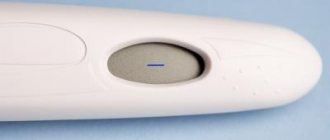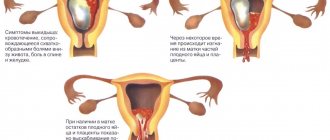Normally, the menstrual cycle in women begins at 12–13 and ends at 45–60 years, but everyone’s body is individual and these indicators may vary depending on the presence or absence of hormonal changes. In addition, it is rare for modern women to live without diseases that affect the reproductive and endocrine systems. At the moment we are talking about a delay in menstruation after 40 years, or more precisely, about its causes in women. Since there are many provoking factors, you need to start with the most common ones.
What is considered a delay?
The average duration of the menstrual cycle is 28-30 days. For most people it lasts just that long. If the cycle is longer or shorter, this can be both a variant of the norm and a sign of pathology. To make it easier to determine the individual timing of when your critical days should begin, gynecologists recommend keeping a personal menstrual calendar. It is convenient to use a special application for this.
The cycle length is calculated as follows:
- 1st day - on which menstruation began;
- the last one is the one that precedes the onset of the next menstruation.
After 3-4 months of observation, the lady will be able to predict the date of the next menstruation with an accuracy of the day, provided that the cycle is regular. A deviation of 1 to 4 days is considered normal. A longer shift should alert you if, after 40 years, with a delay in menstruation, the test is negative.
Important! If the cycle is irregular, it is necessary to calculate the date of the upcoming menstruation, focusing on the longest period over the previous 6 months.
Some cases of delayed periods lasting 5-7 days occur due to the fact that the egg, for some reason, needs more time to mature. A woman does not have to worry about her health if her periods are delayed no more than 1-2 times every six months. More frequent shifts, as well as the absence of menstrual flow for 2 months longer, are a reason for diagnosis.
Why is there a delay?
With age, every woman begins to notice various irregularities in the menstrual cycle. This may be excessively scanty or heavy bleeding, a delay or too early arrival of the regulus, or a complete absence of menstruation (amenorrhea). In case of a delay in menstruation with a negative pregnancy test, you must contact a qualified specialist who will carry out all the necessary diagnostic measures and determine the true cause of the delay.
Pathological causes
Any disease or abnormality in the functioning of vital body systems can affect the regularity of menstruation. The cause of any manifestation of menstrual irregularities is stress in the body, which leads to hormonal imbalance. If a woman experiences a delay in menstruation after 40 years, this indicates the progression of some advanced pathology. Most often, irregular menstruation is caused by the following conditions:
- Diseases of the reproductive system: myomatous nodes, cysts, salpingitis, cancer, adnexitis, etc.;
- Endocrine system disorders: increased blood sugar (diabetes), inflammatory processes in the adrenal glands and thyroid gland, insufficient synthesis of hormones by the sex glands;
- Problems with the respiratory system: pneumonia, bronchial asthma, influenza, ARVI;
- Diseases in the cardiovascular system: varicose veins, infarction, atherosclerosis, hypertension;
- Artificial termination of pregnancy, diagnostic or therapeutic curettage;
- Complications after abortion or surgical intervention in the pelvic organs;
- Excess weight;
- Anorexia;
- Inflammatory and infectious diseases, sexually transmitted diseases;
- Problems in the gastrointestinal tract;
- Burns or frostbite.
In addition to the conditions described above, there are other reasons for the delay. These may include heavy physical work or constant exposure to various types of radiation on the body (chemical, radiation, etc.).
Psychological
The absence of menstruation in a woman can be explained not only by the presence of physiological diseases. Often, a delay may indicate the presence of a psycho-emotional disorder or a depressive state, which can develop due to the following unpleasant situations:
- Family problems;
- Quarrels in the work team;
- Excessive mental stress;
- Sudden change of environment;
- New place of work, residence;
- Troubles in personal life;
- Complexes regarding your appearance.
An unnatural level of hormones produced, which provokes a disruption in the menstrual cycle, which occurred as a result of the reasons described above, does not pose any particular danger to the woman. The main thing is to promptly determine the cause of the pathological condition and begin to eliminate it.
Climax
The onset of menopause can also cause a delay in menstruation after 40-45 years. If your period does not come, no diseases are detected, and the test is negative, then this means the beginning of premenopause (the first stage of menopause).
Menopause is a physiological state of the body of an adult woman, which implies the beginning of suppression of reproductive function and deterioration of the ovaries, which, throughout the woman’s life, synthesize the required amount of sex hormones (estrogen and progesterone). Every woman whose age exceeds 40-45 years is exposed to this condition. The main sign indicating the onset of menopause is a disturbance in the menstrual cycle, during which spotting becomes more scanty, the delay lasts more than 1-2 months, and then menstrual flow disappears altogether. Also, if the regulation is irregular, you should pay attention to the appearance of the following symptoms:
- Frequent hot flashes (more than 10 times a day);
- Increased irritability;
- Headaches and dizziness;
- Frequent insomnia;
- Dryness in the vaginal cavity;
- Increased sweating;
- Frequent urination.
If, in addition to the absence of menstruation, you discover the presence of the above symptoms, then most likely this indicates the onset of menopause. To confirm the onset of menopause, you should visit an experienced gynecologist who will conduct all the necessary tests and prescribe the necessary medications to get rid of unpleasant symptoms.
Reasons for missed periods after 40 years
Every 28-30 days, an egg matures in the female body. If fertilization has occurred, it attaches to the surface of the mucous layer of the uterus, and the development of the embryo begins. Otherwise, the unfertilized egg leaves the body along with the epithelium. This process is called menstruation. The discharge lasts from 3 to 6 days. During the cycle, hormonal fluctuations occur in the female body. They affect mood, well-being and performance.
A few days before the onset of menstruation, unpleasant symptoms appear due to a sharp change in the level of female sex hormones. This condition is called premenstrual syndrome. Menstrual irregularities are more common in mature women. The older the woman, the higher the likelihood of delay not caused by pregnancy.
Doctors divide the reasons why periods are delayed into two groups:
- Psychological. The psycho-emotional background affects the production of hormones. Their content decreases or increases when a woman is in a stressful situation, overtired, upset or excited. In such a situation, you should not be surprised that menstruation will begin a few days later than expected.
- Gynecological. Doctors include pregnancy and diseases of the reproductive organs in this group of factors. The true cause of the delay can only be identified using diagnostic procedures.
Pathological causes
Any disease puts a strain on the body and may be accompanied by changes in a woman’s menstrual cycle. The reason for a delay in menstruation in a woman aged 40 may be dysfunction of the liver, kidneys, bladder and other organs that are not necessarily part of the reproductive system.
Most often, the absence of menstruation on time is due to the following types of diseases:
- Endocrine. Anorexia, obesity, diabetes mellitus, impaired thyroid function, inflammation of the adrenal glands, decreased hormone synthesis.
- Respiratory organs. ARVI, bronchitis, influenza, pneumonia.
- Cardiovascular. Heart attack, hypertension, varicose veins.
- Gynecological. Salpingitis, cyst, fibroids, endometritis, adnexitis. Consequences of curettage, abortion or other surgery.
- Other. STDs, hypothermia, frostbite, burns, gastritis.
A delay in menstruation at the age of 40 due to psychological disorders is a very common occurrence, so a woman needs to protect herself from stress and nervous tension. Another provoking factor is hyperandrogenism. This term combines a group of diseases that develop as a result of increased levels of male sex hormones. As a rule, hyperandrogenism develops against the background of excess weight. As a result, the level of female sex hormones decreases and ovulation is delayed.
Possible reasons
Since one pregnancy test does not guarantee the correct test result due to expiration date or improper storage, it is recommended to take products from several different manufacturers. In this case, only a doctor can completely refute or confirm the onset of pregnancy after conducting an ultrasound examination of the pelvic organs and studying the blood for hCG.
If the results obtained completely exclude pregnancy, and the cessation of menstrual delay is not observed for about 9 days, it is necessary to undergo additional examinations, since the reason for the absence of menstrual bleeding may be stress or more serious illnesses.
The list of causes of menstrual irregularities with a delay of 9 days includes:
- sudden weight loss or gain;
- change in climatic conditions;
- suffered stress with deep feelings;
- a sharp increase in physical activity on the body;
- existing disorders in the gastrointestinal tract;
- disturbances in proper sleep at night and activity during the day;
- lactation (breastfeeding);
- taking medications, the composition of which may affect the functioning of the reproductive system (as side effects of drug therapy).
Among the common reasons for the lack of a timely onset of menstruation, it is worth highlighting the imbalance of hormonal balance in the female body. In any case, treatment of the patient involves the establishment of his daily life. This is especially true for normalizing the diet, restoring healthy, full sleep and rest, as well as eliminating diseases associated with the functioning of the gastrointestinal tract. If, after an examination by a gynecologist and receipt of test results, no special deviations are found, it is necessary to create all the conditions so that the body can restore the cyclicity of menstruation on its own.
The absence of pregnancy with a delay in menstruation most often indicates the presence of diseases in the early stages, when medical intervention and appropriate treatment are necessary. Among the more serious reasons for the delay, it is worth highlighting:
- improper functioning of the ovaries;
- features of the reproductive system of the female body that are inherited;
- the use of incorrectly selected contraceptives, which provokes serious hormonal imbalances;
- the presence of benign and malignant tumors;
- inflammatory processes in the genital area;
- infectious damage to areas of the reproductive system;
- formation of a cyst (a hollow tumor with internal contents).
Some of the causes may have accompanying symptoms, for example, a burning sensation and itching in the genital area, but existing neoplasms and tumors, especially in the early stages, proceed almost unnoticed and can only be detected after a thorough examination by a doctor. In such cases, additional examinations are necessarily prescribed, as well as medication or surgical treatment in order to preserve as much as possible the reproductive system and the woman’s ability to become pregnant in the future.
Among the most dangerous causes of delay, ectopic pregnancy should also be highlighted, which must not only be detected in a timely manner, but also all dangerous factors must be eliminated, since further growth of the pathology without the intervention of doctors can provoke uterine bleeding and lead to death.
Any self-medication in such cases is unacceptable, since there is a high risk of further aggravating the situation. This applies to both taking pharmaceutical medications and any herbal preparations prepared at home. In any situation, you must first consult a doctor and have his personal permission to use a particular medicine.
Psychological reasons
Troubles at work and in your personal life, chronic lack of sleep, nervous and physical overload - all this can provoke a hormonal imbalance, the consequence of which is a cycle failure. Any event that changes the usual way of life can disrupt the regularity of menstrual bleeding. This could be a change of job, moving to a new place of residence, divorce, illness of a relative, vacation in other climatic conditions, change of time zone and much more.
Some ladies believe that such a reaction of the body to change occurs only in adulthood. In fact, a stressful situation can provoke a delay both in youth and in the premenopausal period.
What to do?
The first thing you need to do is see a doctor and get the necessary tests. True, this is not necessary if a woman has had one of her reproductive organs removed (everything is clear). It is necessary to treat anorexia with a psychologist, since it is he who is able to convince a woman of her usefulness, after which she will develop an appetite, on which the normal functioning of all organs depends.
If a woman plays men's sports and takes various drugs to build muscles, she needs to either stop doing this or come to terms with amenorrhea. If you suspect any disease, you should contact a therapist, and he, in turn, after an initial examination, will refer you to the right specialist: a gynecologist, endocrinologist, neurologist, or advise you to undergo treatment at a rehabilitation center.
You can, of course, start self-treatment with folk remedies if you suspect you have the above diseases. But it is worth remembering that it is almost always ineffective, and sometimes even fraught with complications of the disease. This is because few people succeed in making a correct diagnosis without first undergoing tests.
Other reasons for delayed periods after 40 years
At any age, ladies are not recommended to lift too much weight. Of course, this does not apply to professional weightlifters. For a mature woman, lifting an unbearable weight can result in rupture of the cyst, uterine bleeding, bending or displacement of the uterus. These are not all possible complications.
Delayed menstruation after 40 years - reasons:
- rearrangement of cabinets and other heavy furniture;
- physical labor “for wear and tear”;
- regularly carrying heavy bags;
- amateur training;
- mistakes when performing strength exercises;
- any excessive effort with a weak musculoskeletal system.
An unbalanced diet is another common cause of irregular cycles. If the menu is dominated by the same type of products, semi-finished products and fast food, you should not be surprised that menstruation begins with a long delay.
Strict diets, vegetarianism and fasting also negatively affect women's health. In addition to delay, a poor diet can cause discharge in early pregnancy. After 40 years, it is necessary to especially carefully monitor the variety of diet and the quality of foods consumed. This measure will help avoid frequent cycle disruptions and early onset of menopause.
Diagnostics
When the test is negative after a delay in menstruation after 40 years, and the delay exceeds 7 days, you should consult a gynecologist. First, the doctor will examine the woman in a chair, then take a smear from the cervical canal. A sample of the material is examined in the laboratory to identify abnormalities. Thanks to this test, it is possible to recognize a precancerous condition in time and prevent tissue malignancy. If the study does not reveal any abnormalities, the next smear is taken after 3 years, provided that the woman has not had sexual intercourse during this time. For women of reproductive age who are sexually active, the study is prescribed earlier.
In addition to the Pap smear, lipid and biochemical blood tests are performed. To confirm the absence of pregnancy (it may cause a delay in menstruation), an hCG test is done. In addition to these methods, a hemostasiogram, ultrasound of the reproductive organs and mammography are performed. These procedures make it possible to detect polycystic disease, fibroids and other pathological structures.
Climax
The menstrual cycle is a sign of a woman’s lack of fertilization, which is possible until a certain age. Nature provides for everything: when a woman gets old, often gets sick and becomes disabled, she should not get pregnant or give birth, since she will not be able to raise children due to her health condition. It is not surprising that hormones are no longer produced in the required quantities and menstruation stops at age 45 or much later.
The period of menopause is called menopause. Its onset in women at 40 years of age is considered early, at 46 years of age it is considered normal. However, there are cases (rarely) when menopause in women comes much earlier, at 30-35 years. This is a very difficult period, in addition to the cessation of menstruation, it is characterized by the following symptoms:
- dizziness;
- severe headaches;
- mood swings;
- increased sweating;
- changes in body temperature;
- causeless weight gain;
- lack of sexual desire;
- cardiopalmus.
All these problems are due to the fact that sex hormones in women cease to be produced immediately, but gradually. You should know that during menopause, menstruation rarely stops once and for all. In women, this happens in stages: first, the amount of discharge is significantly reduced or its absence lasts no more than one month (irregular cycle).
Everyone knows that the problem under discussion can be provoked by the fertilization of an egg by a sperm, but at the moment we are talking about a delay in menstruation after 40 years with a negative pregnancy test. It should be noted that amenorrhea in women at this age, in addition to menopause, is caused by various reasons.











